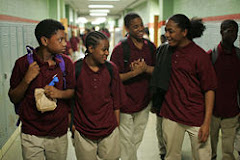"See, hitters know where they like the ball when they're hitting. I like the ball on the inside part of the plate, so I can turn quickly on it and pull it down the line," I said, standing at the imaginary home plate in my classroom, with the imaginary bat, facing the imaginery pitcher. "Troy Maxson was also a big guy, though, but he liked the ball up and out over the plate - a fastball on the outside corner was his pitch of choice. That's why he says that 'death ain't nothin' but a fastball on the outside corner' - because it's something he can handle." I gestured with my imaginary bat towards the outside corner of my imaginary home plate.
And with that little moment, you can probably tell why I loved today. I got to talk about literature and baseball all day.
Fences has long been a favorite of mine. The story of a former Negro-League baseball star who was never able to make much of a living at the sport he excelled at, he is now a garbage collector. His son is being recruited to play college football, but he resists, saying and thinking that sports are a white man's game, something that will never bring success. Learn a trade, he says, like fixing cars, and forget about that sports stuff. He hides his pain, his bitterness, and his disappointment behind this protection of his son, but doesn't do a great job of dealing with it: he eventually drives his son away and, later, his wife, with an outrageous act of unfaithfulness, an act that he explains to his wife using baseball metaphors: "... you born with two strikes on you before you come to the plate. You got to guard it closely... always looking for the curve-ball on the inside corner. You can't afford to let none get past you. You can't afford a call strike. If you going down... you going down swinging. Everything lined up against you. What you gonna do. I fooled them, Rose. I bunted. When I found you and Cory and a halfwy decent job... I was safe... Then when I saw that gal.. she firmed up my backbone. And aI got to thinking that if I tried... I just might be able to steal second. Do you understand after eighteen years I wanted to steal second."
There's this motif of baseball linked to tragedy throughout the play. It's not only that Troy Maxson is a classic tragic hero, a protagonist brought down by a tragic flaw, by his own errors in judgement. It's also that he emphasizes this point by constantly mentioning tragic baseball players: Josh Gibson, perhaps the greatest baseball in the history of the game, black or white, is mentioned twice in the first scene. Today, I told the students about how he hit more home runs than Barry Bonds, about how he died at the age of 35 under somewhat mysterious circumstances, just two months before Jackie Robinson broke the color line. Wilson has Troy mention Roberto Clemente in the last scene of Act I. The famous Puerto Rican star died during his playing career in a plane crash. Sandy Koufax, the first Jewish-American baseball star, is also mentioned, and it's pretty clear it's purposeful; Wilson wants us to see baseball as a metaphor for America here, as he's using the sport's racism as a critique of the American dream, and connecting that with tragedy.
I got so into it today. Wearing my Negro Leagues Baseball t-shirt, and gave my "lecture" - one of about five lectures the kids will hear from me all year - by running around the room as much as I could, adding pictures and anecdotes and the aforementioned invisible-batting-stance moment. My principal walked in at one point, and I thought I was in trouble, because he left, and my department head came down about three minutes later. In my head, I imagined him running down to her, and saying something like, "You better get your teacher in line. He's down there talking about baseball, that's it." But, instead, my department head stayed and watched me, and asked if she could video-tape me, to keep the lecture in the archives so she could show it in the future. We agreed that I'd come and be the guest lecturer in her class on Monday instead - an accessible and working video camera in our school school, as if - so that made me feel good.
I was worried that I'd bore the kids with my 15 or 20 minutes of discussing Negro League baseball, and the various baseball allusions in Fences, but several seemed really into it.
But Desharnae, a girl that I've had all of two weeks, was kind of right when she smiled and said, "I see what you tryin' to do... I like it. Using any reason to talk about baseball. I see what you doin'." Yup.
Resep Masakan
11 years ago

1 comment:
That is one homerun of a lesson plan.
Post a Comment